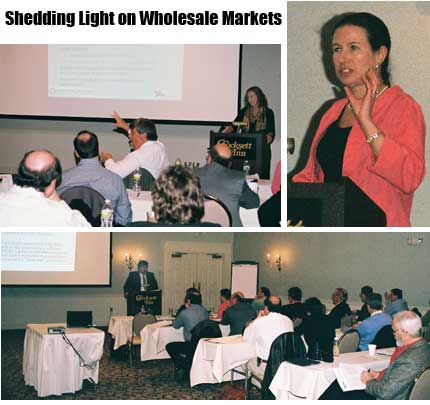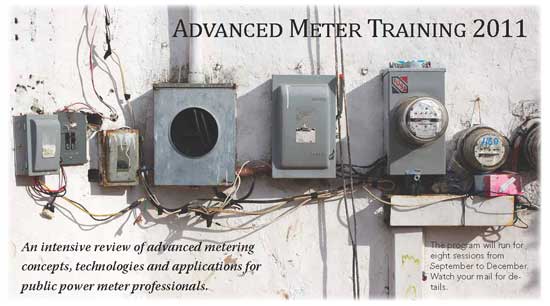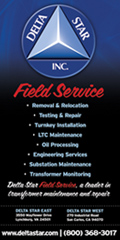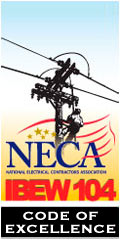NEPPA eNewsletter
May 2011
|
In late March, with snow still covering parts of the Berkshires, 17 public power officials drove out on the Mass. Pike to beautiful Lenox, Massachusetts. They were heading to the famous Cranwell Conference Center to attend NEPPA’s annual Public Utility Management Program, an executive development program now in its 18th year of service to the New England public power community. After 17 successful years at the New England Center in Durham, New Hampshire, the program had to find a new home in 2011, due to the Center’s closing last June. And so, after a review of many potential sites, we signed a contract with the Cranwell Resort and Conference Center to host this unique program. The decision has turned out to be a good one: Cranwell staff and facilities were excellent, and the setting proved ideal for a few intense days of classroom discussions, introspection and critical thinking. This year’s program focuses on eight essential management skills for public power leaders: four each in the March and November sessions. In March, the topics were self-motivation and personal initiative, critical thinking and learning, business and financial skills and people skills. The classes were led by individuals who brought significant experience to their topics: Dr. Paul Powers, a licensed psychologist who consults with and coaches senior executives in a wide variety of industries; Dr. Rockie Blunt, NEPPA’s Director of Educational Services, who has done extensive training in the fields of communications and learning and Chuck Underhill, Power Supply Engineer for the Danvers Electric Light Department and also a consultant on rates and finance to public power utilities. Each of them did an outstanding job in covering their topics, leading class discussions and making sure each participant had a "take away" from each day’s work. The November session for this year’s program will cover four more management skills: communications, negotiation and persuasion, strategic planning and political skills. It promises to be equally informative, stimulating and enjoyable to our participants. We still have room for a few more who would like to join us. NEPPA’s Public Utility Management Program is truly a unique professional development and learning experience. It was developed by public power professionals for public power professionals, and has had a profound impact on the way that many participants see themselves, their jobs and their careers. We encourage all NEPPA members to take advantage of this program, either this year or in the future, and to see for themselves the impact that it can have on their organizations. ##SHARELINKS##
|
|
The Georgetown (Mass.) Municipal Light Department will sponsor the Jim Young & Family Benefit Golf Tournament on Monday, May 23, 2011 at the Black Swan Country Club in Georgetown. Proceeds from the tournament will benefit the Georgetown Municipal Light Department lineworker who was severely injured in an electrical accident on September 26, 2010. Young was hospitalized for eight weeks after the accident, first at Massachusetts General Hospital and later at the Spaulding Rehabilitation Hospital. As a result of his injuries, he lost both arms. Although he has made an amazing recovery through perseverance, courage and the love of family and friends, there is still a long road Jim must travel to make a full recovery. The Jim Young & Family Golf Tournament will begin with registration from 11 a.m. to noon, followed by a shotgun start at noon. The cost is $125 per golfer and includes a four-person scramble, 18 holes of golf with cart, lunch, a buffet dinner and a gift bag. Prizes will be awarded to the winning foursome, longest drive and closest to the pin. The tournament will be limited to 144 golfers and entries must be received by May 10th. Non-golfers can also support the event by attending the dinner following the reception at 6 p.m., or by sponsoring a hole, cart or being a major sponsor. The cost for dinner only is $30 per person while sponsorship opportunities are available at the following levels: Premiere Sponsor ($1,200), Dinner or Lunch Sponsor ($500) or Cart or Hole Sponsor ($100). Donated raffle and auction items are welcome. To register for the tournament or dinner or to become a sponsor, send your check, made payable to the Friends of Jim Young, and send to the Friends of Jim Young, Georgetown Municipal Light Department, 94 Searle Street, Georgetown, MA 01833. For additional information, please email wsnow@comcast.net or pdion@wmgld.com.
##SHARELINKS##
|
|
SourceOne, a leading energy advisory firm, has recently joined the Northeast Public Power Association (NEPPA) as a corporate member. A subsidiary of Veolia Energy North America, SourceOne is a nationally recognized energy management and strategic advisory services company, providing a unique mix of energy services focused on complex capacity and reliability issues affecting customers. SourceOne also offers a strategic, customized approach to utilizing available energy resources and generating new solutions. "We are excited about being a part of the NEPPA community and look forward to attending the many events and programs NEPPA hosts throughout the year," said Vincent Martin, President of SourceOne. With offices in Boston, New York City, Connecticut and Los Angeles, SourceOne manages more than 850 megawatts (MW) of electric power, 2 bcf of natural gas and $500 million of utility bill processing. ##SHARELINKS##
|
|
More than 40 public power officials from throughout New England had a crash course in the operation of wholesale power markets in early April, courtesy of the NEPPA Regional Power Supply Committee. The course was a one-day workshop on the operation of wholesale markets in New England and was presented by power supply managers from several NEPPA member utilities with direct experience in power market operations. Public power managers, engineers and Board members from utilities in all six New England states participated in the workshop. Brian Forshaw, Director of Power Supply for the Connecticut Municipal Electric Energy Cooperative and chairman of the NEPOOL Participants Committee, opened the workshop with an overview of ISO-New England and NEPOOL governance, explaining how stakeholders participate in the activities of both organizations and how decisions on market rules and procedures are actually made. Following his presentation, each of the different New England power markets was reviewed: Energy Markets by Craig Kieny, Senior Resource Planner for the Vermont Electric Cooperative; Capacity Markets by Jane Parenteau, Energy Services Manager for the Reading Municipal Light Department and Ancillary Markets by Heather Manypenny, Power Resources Executive for the New Hampshire Electric Cooperative. Heather also provided an overview of the transmission system in New England, how transmission rates are set and the impact of rapidly increasing transmission costs in the region. Commissioner Marc Spitzer of the Federal Energy Regulatory Commission had been scheduled to speak at the workshop and provide his agency’s perspectives on market operations but had to cancel due to an unexpected schedule conflict. Pat Hyland, NEPPA Executive Director, told the participants that Commissioner Spitzer has accepted an invitation to attend the NEPPA Annual Conference in August and will speak on the second day of the conference. Copies of the workshop presentations are available on the NEPPA website. ##SHARELINKS##
|
|
For the past decade, NEPPA’s annual Customer Service Conference has provided an opportunity for customer service professionals in the public power industry to meet in a unique setting and share information, ideas and inspiration. This year’s conference will be held in historic Concord, Massachusetts, the site of the first battle of the American Revolution. Participants will learn about Concord’s historic past, as well as the impact of technology on customer service in the twenty-first century from three different perspectives: a coffee brewing company, a website that connects customers with human beings and a technology consultant who studies how successful innovations get introduced to the world. We will also recognize outstanding customer service professionals with the presentation of the annual Carol Tracey Customer Service Award.
##SHARELINKS##
|
##SHARELINKS##
|
|
The Northeast Public Power Association would like to invite all general managers, general foremen and supervisors to attend the annual Apprentice Lineworker Skills Assessment Rodeo to be held (rain or shine) on June 15th and 16th at NEPPA's field training facility, located on Silver Lake Avenue in Pascoag, RI.
Please let us know if you can attend this event. Email sdavies@neppa.org if you plan to have lunch on either day or call Sharon at 508-482-5906. We look forward to seeing you. ##SHARELINKS##
|
|
By Rockie Blunt Think back to the last time you learned a new skill. Did you get it right away, or did you struggle, only gradually coming to understand what you were doing? And how long did it take before you felt totally comfortable doing it? Chances are, it didn’t happen overnight. It’s exciting and very gratifying to learn new skills, but that doesn’t mean it’s easy. Learning can be a slow process in which we travel from discovering what has to be learned, to taking some first tentative steps, to feeling more confident as we get more practice, to finally mastering the task so thoroughly that we can do it "with our eyes closed." There’s actually a term to describe this process—the "learning stages model"—and it consists of four stages: 1. The unconscious incompetent stage. First of all, "incompetent" does not mean stupid; it means unskilled, or not able to do something. In this first stage, in fact, you are not even aware (that is, unconscious) of what you don’t know about the task. Think of learning to drive a car. Before you start taking lessons, you’re not even aware of what you don’t know about driving. 2. The conscious incompetent stage. When you do get behind the wheel, you become acutely aware of how much you don’t know. In fact, all the new things can overwhelm you, or at least make you go very slowly as you try to figure them out. In this stage you realize how unskilled you are. 3. As you gain more experience driving, you eventually enter the conscious competent stage. You know how to drive, but you still have to practice because there is still so much to learn. You are concentrating on driving as you drive. The good news is that in this stage you begin to feel more comfortable. 4. Finally, as a result of investing a considerable amount of time and effort on the skill, you eventually reach the final stage: you become an unconscious competent. You have driven so often that you can do it without concentrating on it. The skill has become habitual, or second nature to you, and you are on "automatic pilot." How does the "learning stages model" relate to you on the job? First, don’t feel bad if it takes you a while to perform a new skill effortlessly. And second, keep the model in mind the next time you teach something to someone. Be patient. Build in time for the person to try the task, make mistakes and try again. Because you have already mastered that skill—and are therefore a unconscious competent at it—you are able to do it quickly. But if it is the first time for your employee, who may be an unconscious incompetent or a conscious incompetent at the time of your training, it will take longer. Let them travel through the four stages. ##SHARELINKS##
|







